- Home
- George Orwell
Coming Up for Air Page 2
Coming Up for Air Read online
Page 2
I had a look at the paper, but there wasn't much news. Down in Spain and over in China they were murdering one another as usual, a woman's legs had been found in a railway waiting-room and King Zog's wedding was wavering in the balance. Finally, at about ten o'clock, rather earlier than I'd intended, I started out for town. The kids had gone off to play in the public gardens. It was a beastly raw morning. As I stepped out of the front door a nasty little gust of wind caught the soapy patch on my neck and made me suddenly feel that my clothes didn't fit and that I was sticky all over.
II
Do you know the road I live in-Ellesmere Road, West Bletchley? Even if you don't, you know fifty others exactly like it.
You know how these streets fester all over the inner-outer suburbs. Always the same. Long, long rows of little semidetached houses-the numbers in Ellesmere Road run to 212 and ours is 191-as much alike as council houses and generally uglier. The stucco front, the creosoted gate, the privet hedge, the green front door. The Laurels, The Myrtles, The Hawthorns, Mon Abri, Mon Repos, Belle Vue. At perhaps one house in fifty some anti-social type who'll probably end in the workhouse has painted his front door blue instead of green.
That sticky feeling round my neck had put me into a demoralised kind of mood. It's curious how it gets you down to have a sticky neck. It seems to take all the bounce out of you, like when you suddenly discover in a public place that the sole of one of your shoes is coming off. I had no illusions about myself that morning. It was almost as if I could stand at a distance and watch myself coming down the road, with my fat red face and my false teeth and my vulgar clothes. A chap like me is incapable of looking like a gentleman. Even if you saw me at two hundred yards' distance you'd know immediately-not, perhaps, that I was in the insurance business, but that I was some kind of tout or salesman. The clothes I was wearing were practically the uniform of the tribe. Grey herringbone suit a bit the worse for wear, blue overcoat costing fifty shillings, bowler hat and no gloves. And I've got the look that's peculiar to people who sell things on commission, a kind of coarse brazen look. At my best moments, when I've got a new suit or when I'm smoking a cigar, I might pass for a bookie or a publican, and when things are very bad I might be touting vacuum cleaners, but at ordinary times you'd place me correctly. 'Five to ten quid a week', you'd say as soon as you saw me. Economically and socially I'm about at the average level of Ellesmere Road.
I had the street pretty much to myself. The men had bunked to catch the 8.21 and the women were fiddling with the gas-stoves. When you've time to look about you, and when you happen to be in the right mood, it's a thing that makes you laugh inside to walk down these streets in the inner-outer suburbs and to think of the lives that go on there. Because, after all, what is a road like Ellesmere Road? Just a prison with the cells all in a row. A line of semidetached torture-chambers where the poor little five-to-ten-pound-a-weekers quake and shiver, every one of them with the boss twisting his tail and the wife riding him like the nightmare and the kids sucking his blood like leeches. There's a lot of rot talked about the sufferings of the working class. I'm not so sorry for the proles myself. Did you ever know a navvy who lay awake thinking about the sack? The prole suffers physically, but he's a free man when he isn't working. But in every one of those little stucco boxes there's some poor bastard who's never free except when he's fast asleep and dreaming that he's got the boss down the bottom of a well and is bunging lumps of coal at him.
Of course the basic trouble with people like us, I said to myself, is that we all imagine we've got something to lose. To begin with, nine-tenths of the people in Ellesmere Road are under the impression that they own their houses. Ellesmere Road, and the whole quarter surrounding it, until you get to the High Street, is part of a huge racket called the Hesperides Estate, the property of the Cheerful Credit Building Society. Building societies are probably the cleverest racket of modern times. My own line, insurance, is a swindle I admit, but it's an open swindle with the cards on the table. But the beauty of the building-society swindle is that your victims think you're doing them a kindness. You wallop them, and they lick your hand. I sometimes think I'd like to have the Hesperides Estate surmounted by an enormous statue to the god of building societies. It would be a queer sort of god. Among other things it would be bi-sexual. The top half would be a managing director and the bottom half would be a wife in the family way. In one hand it would carry an enormous key-the key of the workhouse, of course-and in the other-what do they call those things like French horns with presents coming out of them?-a cornucopia, out of which would be pouring portable radios, life-insurance policies, false teeth, aspirins, French letters and concrete garden rollers.
As a matter of fact in Ellesmere Road we don't own our houses, even when we've finished paying for them. They're not freehold, only leasehold. They're priced at five-fifty, payable over a period of sixteen years, and they're a class of house which, if you bought them for cash down, would cost round about three-eighty. That represents a profit of a hundred and seventy for the Cheerful Credit, but needless to say the Cheerful Credit makes a lot more out of it than that. Three-eighty includes the builder's profit, but the Cheerful Credit, under the name of Wilson & Bloom, builds the houses itself and scoops the builder's profit. All it has to pay for is the materials. But it also scoops the profit on the materials, because under the name of Brookes & Scatterby it sells itself the bricks, tiles, doors, window-frames, sand, cement and, I think, glass. And it wouldn't altogether surprise me to learn that under yet another alias it sells itself the timber to make the doors and window-frames. Also-and this was something which we really might have foreseen, though it gave us all a knock when we discovered it-the Cheerful Credit doesn't always keep to its end of the bargain. When Ellesmere Road was built it gave on some open fields-nothing very wonderful, but good for the kids to play in-known as Platt's Meadows. There was nothing in black and white, but it had always been understood that Platt's Meadows weren't to be built on. However, West Bletchley was a growing suburb, Rothwells'jam factory had opened in '28 and the Anglo-American All-Steel Bicycle factory started in '33, and the population was increasing and rents were going up. I've never seen Sir Hubert Crum or any other of the big noises of the Cheerful Credit in the flesh, but in my mind's eye I could see their mouths watering. Suddenly the builders arrived and houses began to go up on Platt's Meadows. There was a howl of agony from the Hesperides, and a tenants' defence association was set up. No use! Cram's lawyers had knocked the stuffing out of us in five minutes, and Platt's Meadows were built over. But the really subtle swindle, the one that makes me feel old Crum deserved his baronetcy, is the mental one. Merely because of the illusion that we own our houses and have what's called 'a stake in the country', we poor saps in the Hesperides, and in all such places, are turned into Crum's devoted slaves for ever. We're all respectable householders-that's to say Tories, yes-men and bum-suckers. Daren't kill the goose that lays the gilded eggs! And the fact that actually we aren't householders, that we're all in the middle of paying for our houses and eaten up with the ghastly fear that something might happen before we've made the last payment, merely increases the effect. We're all bought, and what's more we're bought with our own money. Every one of those poor downtrodden bastards, sweating his guts out to pay twice the proper price for a brick dolls' house that's called Belle Vue because there's no view and the bell doesn't ring-every one of those poor suckers would die on the field of battle to save his country from Bolshevism.
I turned down Walpole Road and got into the High Street. There's a train to London at 10.14. I was just passing the Sixpenny Bazaar when I remembered the mental note I'd made that morning to buy a packet of razor-blades. When I got to the soap counter the floor-manager, or whatever his proper title is, was cursing the girl in charge there. Generally there aren't many people in the Sixpenny at that hour of the morning. Sometimes if you go in just after opening-time you see all the girls lined up in a row and given their morning curse, just to get them
into trim for the day. They say these big chain-stores have chaps with special powers of sarcasm and abuse who are sent from branch to branch to ginger the girls up. The floor-manager was an ugly little devil, undersized, with very square shoulders and a spiky grey moustache. He'd just pounced on her about something, some mistake in the change evidently, and was going for her with a voice like a circular saw.
'Ho, no! Course you couldn't count it! Course you couldn't. Too much trouble, that'd be. Ho, no!'
Before I could stop myself I'd caught the girl's eye. It wasn't so nice for her to have a fat middle-aged bloke with a red face looking on while she took her cursing. I turned away as quickly as I could and pretended to be interested in some stuff at the next counter, curtain rings or something. He was onto her again. He was one of those people who turn away and then suddenly dart back at you, like a dragon-fly.
'Course you couldn't count it! Doesn't matter to you if we're two bob out. Doesn't matter at all. What's two bob to you? Couldn't ask you to go to the trouble of counting it properly. Ho, no! Nothing matters 'ere 'cept your convenience. You don't think about others, do you?'
This went on for about five minutes in a voice you could hear half across the shop. He kept turning away to make her think he'd finished with her and then darting back to have another go. As I edged a bit further off I had a glance at them. The girl was a kid of about eighteen, rather fat, with a sort of moony face, the kind that would never get the change right anyway. She'd turned pale pink and she was wriggling, actually wriggling with pain. It was just the same as if he'd been cutting into her with a whip. The girls at the other counters were pretending not to hear. He was an ugly, stiff-built little devil, the sort of cock-sparrow type of man that sticks his chest out and puts his hands under his coat-tails-the type that'd be a sergeant-major only they aren't tall enough. Do you notice how often they have undersized men for these bullying jobs? He was sticking his face, moustache and all, almost into hers so as to scream at her better. And the girl all pink and wriggling.
Finally he decided that he'd said enough and strutted off like an admiral on the quarter-deck, and I came up to the counter for my razor-blades. He knew I'd heard every word, and so did she, and both of them knew I knew they knew. But the worst of it was that for my benefit she'd got to pretend that nothing had happened and put on the standoffish keep-your-distance attitude that a shopgirl's supposed to keep up with male customers. Had to act the grown-up young lady half a minute after I'd seen her cursed like a skivvy! Her face was still pink and her hands were trembling. I asked her for penny blades and she started rumbling in the threepenny tray. Then the little devil of a floor-manager turned our way and for a moment both of us thought he was coming back to begin again. The girl flinched like a dog that sees the whip. But she was looking at me out of the corner of her eye. I could see that because I'd seen her cursed she hated me like the devil. Queer!
I cleared out with my razor-blades. Why do they stand it? I was thinking. Pure funk, of course. One back-answer and you get the sack. It's the same everywhere. I thought of the lad that sometimes serves me at the chain-store grocery we deal at. A great hefty lump of twenty, with cheeks like roses and enormous fore-arms, ought to be working in a blacksmith's shop. And there he is in his white jacket, bent double across the counter, rubbing his hands together with his 'Yes, sir! Very true, sir! Pleasant weather for the time of year, sir! What can I have the pleasure of getting you today, sir?' practically asking you to kick his bum. Orders, of course. The customer is always right. The thing you can see in his face is mortal dread that you might report him for impertinence and get him sacked. Besides, how's he to know you aren't one of the narks the company sends round? Fear! We swim in it. It's our element. Everyone that isn't scared stiff of losing his job is scared stiff of war, or Fascism, or Communism, or something. Jews sweating when they think of Hitler. It crossed my mind that that little bastard with the spiky moustache was probably a damn sight more scared for his job than the girl was. Probably got a family to support. And perhaps, who knows, at home he's meek and mild, grows cucumbers in the back garden, lets his wife sit on him and the kids pull his moustache. And by the same token you never read about a Spanish Inquisitor or one of these higher-ups in the Russian Ogpu without being told that in private life he was such a good kind man, best of husbands and fathers, devoted to his tame canary and so forth.
The girl at the soap counter was looking after me as I went out of the door. She'd have murdered me if she could. How she hated me because of what I'd seen! Much more than she hated the floor-manager.
III
There was a bombing plane flying low overhead. For a minute or two it seemed to be keeping pace with the train.
Two vulgar kind of blokes in shabby overcoats, obviously commercials of the lowest type, newspaper canvassers probably, were sitting opposite me. One of them was reading the Mail and the other was reading the Express. I could see by their manner that they'd spotted me for one of their kind. Up at the other end of the carriage two lawyers' clerks with black bags were keeping up a conversation full of legal baloney that was meant to impress the rest of us and show that they didn't belong to the common herd.
I was watching the backs of the houses sliding past. The line from West Bletchley runs most of the way through slums, but it's kind of peaceful, the glimpses you get of little backyards with bits of flowers stuck in boxes and the flat roofs where the women peg out the washing and the birdcage on the wall. The great black bombing plane swayed a little in the air and zoomed ahead so that I couldn't see it. I was sitting with my back to the engine. One of the commercials cocked his eye at it for just a second. I knew what he was thinking. For that matter it's what everybody else is thinking. You don't have to be a highbrow to think such thoughts nowadays. In two years' time, one year's time, what shall we be doing when we see one of those things? Making a dive for the cellar, wetting our bags with fright.
The commercial bloke put down his Daily Mail.
'Templegate's winner come in,' he said.
The lawyers' clerks were spouting some learned rot about fee-simple and peppercorns. The other commercial felt in his waistcoat pocket and took out a bent Woodbine. He felt in the other pocket and then leaned across to me.
'Got a match, Tubby?'
I felt for my matches. 'Tubby', you notice. That's interesting, really. For about a couple of minutes I stopped thinking about bombs and began thinking about my figure as I'd studied it in my bath that morning.
It's quite true I'm tubby, in fact my upper half is almost exactly the shape of a tub. But what's interesting, I think, is that merely because you happen to be a little bit fat, almost anyone, even a total stranger, will take it for granted to give you a nickname that's an insulting comment on your personal appearance. Suppose a chap was a hunchback or had a squint or a hare-lip-would you give him a nickname to remind him of it? But every fat man's labelled as a matter of course. I'm the type that people automatically slap on the back and punch in the ribs, and nearly all of them think I like it. I never go into the saloon bar of the Crown at Pudley (I pass that way once a week on business) without that ass Waters, who travels for the Seafoam Soap people but who's more or less a permanency in the saloon bar of the Crown, prodding me in the ribs and singing out 'Here a sheer hulk lies poor Tom Bowling!', which is a joke the bloody fools in the bar never get tired of. Waters has got a finger like a bar of iron. They all think a fat man doesn't have any feelings.
The commercial took another of my matches, to pick his teeth with, and chucked the box back. The train whizzed onto an iron bridge. Down below I got a glimpse of a baker's van and a long string of lorries loaded with cement. The queer thing, I was thinking, is that in a way they're right about fat men. It's a fact that a fat man, particularly a man who's been fat from birth-from childhood, that's to say-isn't quite like other men. He goes through his life on a different plane, a sort of light-comedy plane, though in the case of blokes in sideshows at fairs, or in fact anyone over
twenty stone, it isn't so much light comedy as low farce. I've been both fat and thin in my life, and I know the difference fatness makes to your outlook. It kind of prevents you from taking things too hard. I doubt whether a man who's never been anything but fat, a man who's been called Fatty ever since he could walk, even knows of the existence of any really deep emotions. How could he? He's got no experience of such things. He can't ever be present at a tragic scene, because a scene where there's a fat man present isn't tragic, it's comic. Just imagine a fat Hamlet, for instance! Or Oliver Hardy acting Romeo. Funnily enough I'd been thinking something of the kind only a few days earlier when I was reading a novel I'd got out of Boots'. Wasted Passion it was called. The chap in the story finds out that his girl has gone off with another chap. He's one of these chaps you read about in novels, that have pale sensitive faces and dark hair and a private income. I remember more or less how the passage went:
David paced up and down the room, his hands pressed to his forehead. The news seemed to have stunned him. For a long time he could not believe it. Sheila untrue to him! It could not be! Suddenly realisation rushed over him, and he saw the fact in all its stark horror. It was too much. He flung himself down in a paroxysm of weeping.
Anyway, it went something like that. And even at the time it started me thinking. There you have it, you see. That's how people-some people-are expected to behave. But how about a chap like me? Suppose Hilda went off for a week-end with somebody else-not that I'd care a damn, in fact it would rather please me to find that she'd still got that much kick left in her-but suppose I did care, would I fling myself down in a paroxysm of weeping? Would anyone expect me to? You couldn't, with a figure like mine. It would be downright obscene.
The train was running along an embankment. A little below us you could see the roofs of the houses stretching on and on, the little red roofs where the bombs are going to drop, a bit lighted up at this moment because a ray of sunshine was catching them. Funny how we keep on thinking about bombs. Of course there's no question that it's coming soon. You can tell how close it is by the cheer-up stuff they're talking about it in the newspapers. I was reading a piece in the News Chronicle the other day where it said that bombing planes can't do any damage nowadays. The anti-aircraft guns have got so good that the bomber has to stay at twenty thousand feet. The chap thinks, you notice, that if an aeroplane's high enough the bombs don't reach the ground. Or more likely what he really meant was that they'll miss Woolwich Arsenal and only hit places like Ellesmere Road.

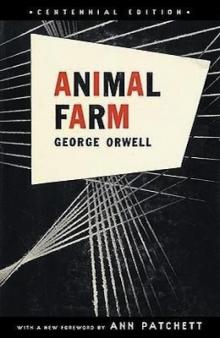 Animal Farm & 1984
Animal Farm & 1984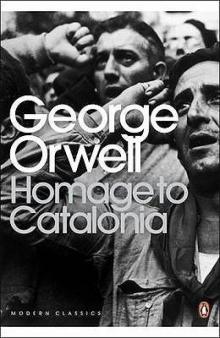 Homage to Catalonia
Homage to Catalonia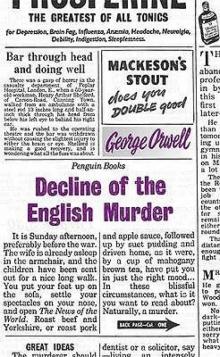 Decline of the English Murder
Decline of the English Murder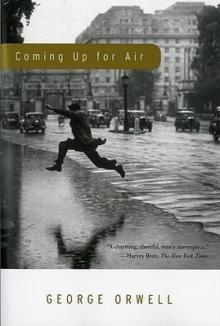 Coming Up for Air
Coming Up for Air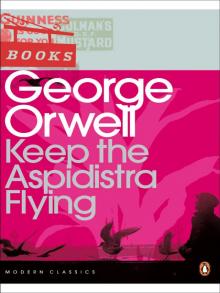 Keep the Aspidistra Flying
Keep the Aspidistra Flying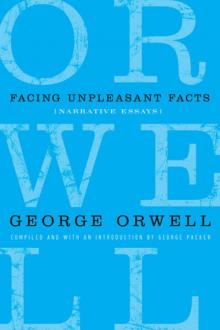 Facing Unpleasant Facts: Narrative Essays
Facing Unpleasant Facts: Narrative Essays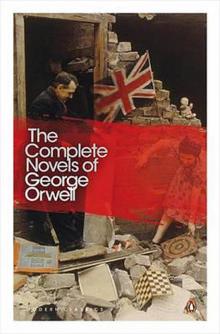 The Complete Novels of George Orwell
The Complete Novels of George Orwell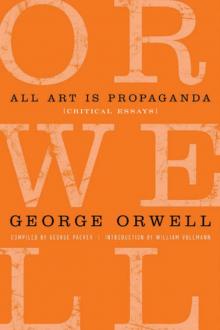 All Art Is Propaganda: Critical Essays
All Art Is Propaganda: Critical Essays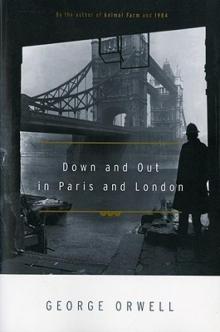 Down and Out in Paris and London
Down and Out in Paris and London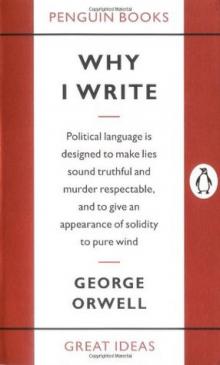 Why I Write
Why I Write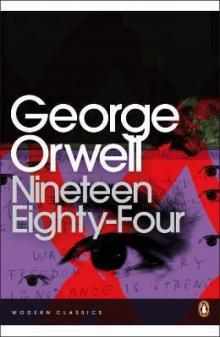 Nineteen Eighty-Four
Nineteen Eighty-Four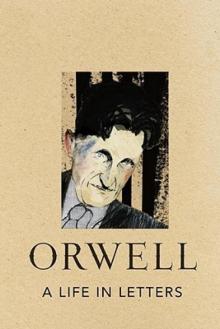 A Life in Letters
A Life in Letters Essays
Essays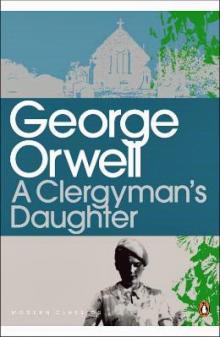 A Clergyman's Daughter
A Clergyman's Daughter Fifty Orwell Essays
Fifty Orwell Essays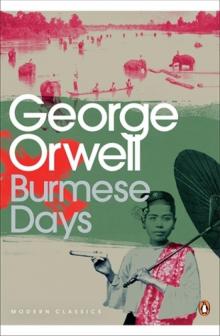 Burmese Days
Burmese Days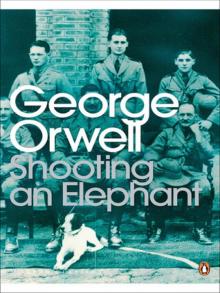 Shooting an Elephant
Shooting an Elephant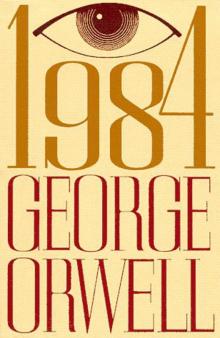 1984 (Penguin)
1984 (Penguin)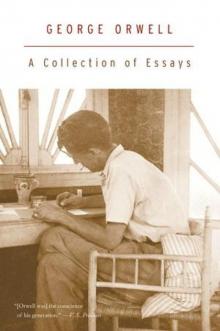 A Collection of Essays
A Collection of Essays 1984
1984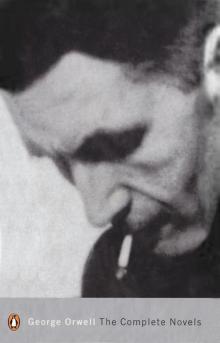 The Complete Novels
The Complete Novels All Art Is Propaganda
All Art Is Propaganda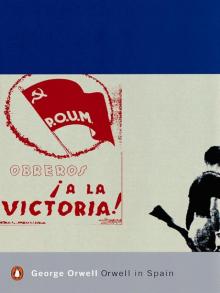 Orwell in Spain
Orwell in Spain Animal Farm: A Fairy Story
Animal Farm: A Fairy Story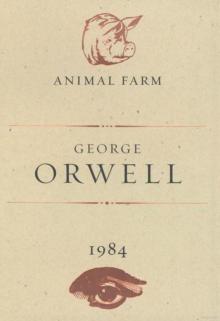 Animal Farm and 1984
Animal Farm and 1984